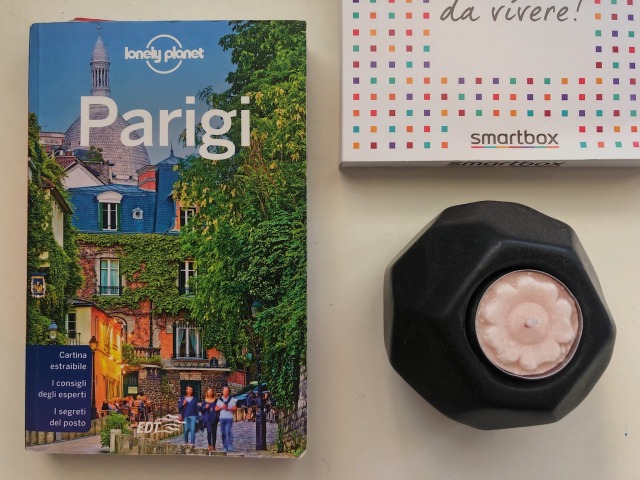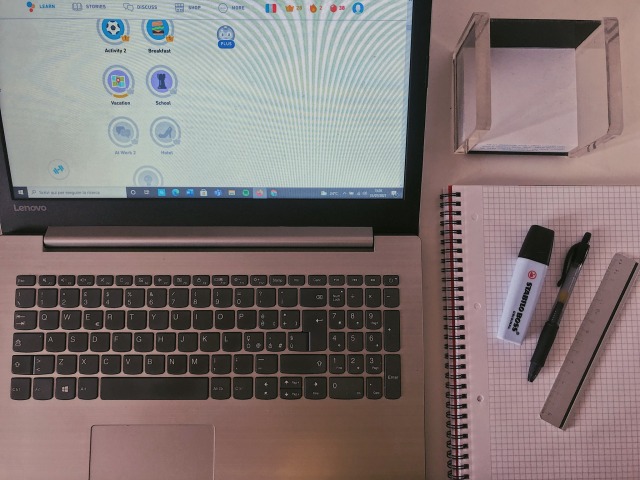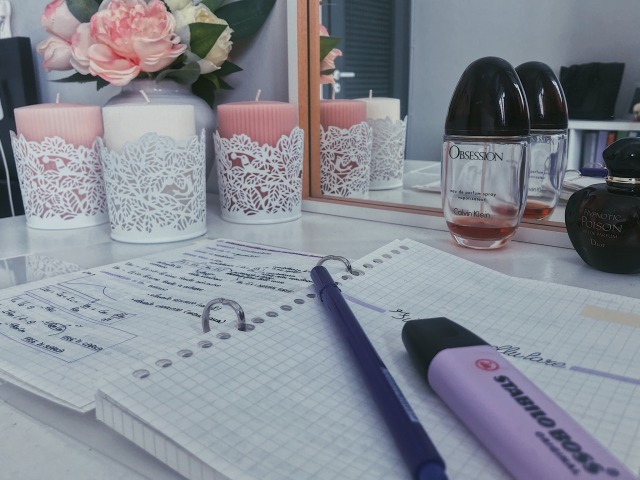#italian studyblr

Hello everyone,
Here I am after more than a month of vacation. I have thought a lot about the past academic year during this summer. It was a tough one, and it challenged me a lot.
In the university that I attend, exams are very close and, to do all of them in time, you must study for two or three exams simultaneously. It requires the ability to prioritize, to dedicate the right amount of time to every subject.
Prioritizing was not immediate to me, and I had to train myself. Here are a few tips that I use when planning the study of multiple subjects at the same time:
1. Split the day:
This technique is good if you are preparing exams of different importance and complexity. Identify the moment of the day in which you are more productive, and dedicate that time to the most complex subject. Then, give time to the second most productive moment for a less complicated exam. If you have a third subject, split the day into three parts, and so on.
For instance, I am more productive in the morning, a bit more distracted in the afternoon, and way less active in the evening, so I base my plans on this scale.
To know the time of the day in which you are more productive, I advise the chronotype test. We all are classifiable as four animals, with different features and routine inclination. For example, I am a dolphin, so I am more productive late in the morning, after some workout and a cold shower. To find your chronotype, do the test here: https://www.doctoroz.com/quizzes/whats-your-chronotype. After having done the quiz, you will periodically receive emails deepening your chronotype.
Also, splitting the day makes studying less boring. I tend to fall asleep if I spend long hours on the same topic while switching from a subject to another waken me up. I would not be able to study for eight hours for the same exam, while I can study four hours for one exam, three for another and one for a third one. By the way, this point is very individual: if you do not fit into this type of planning, look at point 2.
2. Make weekly plans:
This is good whether you are studying for exams of the same importance, or if you prefer to dedicate all day to the same subject.
Dedicate every day of the week to a different exam. You can choose to assign more days for one exam rather than another, based on their complexity.
I use this technique a lot during classes when I do not have all day to study. When I still have to get familiar with the subject, I prefer to give it all day, without any time limit.
3. Match topics:
Generally speaking, the semester’s exams have criteria. You are likely to have similar subjects, or at least with some points in common. Identify the repetitions and the joint topics, and study them together. It will make you save time and have a complete view of that specific argument.
This is all! Let me know if you have some more suggestions that you would like to share. Good luck to all of you with your exams


September 7th 2021
Paris has always been my dream city and due to covid I had to postpone my journey there.
I can finally say that I booked my trip in the capital of France and I’ll be there in a month
Someone said that you live every trip three times: when you dream it, when you live it and when you remember it.
I want to deeply enjoy every part of it and I’m obsessively planning for this trip

Hi guys,
Here I am talking about my study method for the last exam of my second year of med school.
Pharmacology was the most demanding exam I have faced so far, but I found it interesting as well.
I needed all the study techniques I had learned so far in med school to cope with this subject, and I am satisfied with the result.
There is a lot to learn, many formulas to understand and many names to memorise, but it is one step closer to getting into the thick of medicine.
Here is how I dealt with this exam. We can summarise my study method into three parts:
1-Organisation (during lessons):
during the first part, I went to classes and took notes. I later quitted the lectures to focus on individual studying, but I needed to go to lessons at least for the first month. Indeed, I felt the need to see what the professor focused, and what was irrelevant instead.
Also, lectures were helpful to learn the basic concepts of pharmacology. I understood what pharmacokinetics, pharmacodynamics or pharmacoeconomic are about and their fundamentals.
After having gone to classes, I reorganised the material. I did not use the book that much. Indeed, pharmacology is a subject that continuously changes, so every text is old. I consulted the book only for the pharmacokinetics part when I could not understand some formula or definition.
In this phase, it was fundamental to make a scheme. I got a copybook, and I enumerated the pages.
Helping myself with the syllabus, I identified the macrotopics. I used the first sheets for creating an index.
For every argument, I made an accurate scheme using different colours. I utilised all the tools that I knew to make it the more effective possible: I used charts,lists,tables, etc.
I also left some space for the mnemonics (I will deal with this point later in this post).
2-Comprehension
I had to abandon pharmacology for a while to focus on the other exams. When I went back to pharmacology, I restarted to read all my notes.
With a pen, I underlined the most important sentences, and I circledkeywords.
I dedicated this phase of my study to put all the pieces together. I comprehended how drugs act, what the reason for their side effects is, etc.
3-Memorisation
In the last part of my study, I used all the mnemonics I know to learn the names of drugs.
Usually, this is not the most demanding phase of my study. Quite the opposite, it required me much time to memorise all the information.
I created shortstoriesandacronyms to help my memorisation. I wrote these with a pencil in the spaces I had left during the schematization.
Recalling the arguments was vital. I did it alone and with the usual study buddy.
One of the more critical matters, in my opinion, is to select the relevant data. The programme is immense, and it is impossible to know everything, so a choice is needed. Making this selection with a friend makes it more manageable.
As usual, I did not study the day before the exam. If it is correct in general, this time, it was even more vital.
As I said, the syllabus is enormous, so you can not revise everything the day before. You may select the topics you struggle the most with, but having a look at them will only increase your insecurities, which might affect your performance during the exam.
After a long period of studying, relax and mentally prepare for the exam.
And this is all! I hope someone will find this helpful or at least interesting. Good luck to all of you with your exams

Hi guys,
Here I am with another post about one of the more demanding but fascinating exams in med school.
I am a physiology lover over anatomy, and it was a pleasure to study this subject, even though I admit it was tough.
When I first had a look at the syllabus, it seemed to me it was immense. In my University, it is a single exam, with the possibility of splitting it into two partial interims during the same exam session.
Since the coursework was enormous, I decided to break it into pieces, worrying about one part at a time. Every section was a macro topic, such as neurophysiology, physiology of the cardiovascular system, etc.
Here is what I did for every piece:
1.Attend classes: I think this is an unskippable point for the physiology exam. It is a subject that you must understand more than memorizing. Go to class, ask questions, take precise notes, and you will have done nearly half of the work.
2. Deepen: I used the book to add extra information to my notes, to have a complete view of the topic. Physiology is an enormous subject, so the professor does not have time to deal with all the material. Having a general idea of the omitted parts will be helpful to understand the subject better.
3. Schematize: at the end of every section, I made a minimal scheme. It was a sort of index of the topics, with titles and subtitles, to have a precise outline in my mind. I used different colours for every section to visually remember it.
After having gone through all the material, I picked up the pieces. With a general idea of the subject in mind, I read all my notes again. While reading, I hooped the keywords with a pen.
For every part, I wrote on a copybook the essential information, using colour coding. For example, for the cell physiology, which was purple, I wrote all the necessary formulas. For the neurophysiology, which was pink, I schematized the principal sensory pathways. For the endocrine system, I draw a chart of the main hormones and their characteristics.
Then I started recalling everything to understand whether I could build a speech on all the topics. I did this alone, speaking out loud but also with my usual study buddy.
Also, since it was a written test, I practised using the past rounds’ exams.
And that’s it! Hope this can be useful to someone, and good luck if you are preparing for this exam


August 3rd 2021
Went to my mum’s native village today
I find what Simon Biles did at the Olympics really inspiring. How often do we forget to take care of our mental health and do we keep pushing ourselves?


August 2nd 2021
Back home enjoying the summer ☀️
I’ve started reading a book about neuro plasticity which is definitely amazing



July 31st 2021
Got the second shot of vaccine today + enjoying holiday doing what I did not have time to do during the study session

Hello everyone,
I am so glad to announce that I just finished the second year of med school! I am sorry for having not being active on Tumblr during the last months, but now I am here to share my study methods for the exams of this session, beginning with neuroanatomy.
Neuroanatomy was, for me, the better part of the anatomy exam. It may seem chaotic when you start studying it, but I find so fascinating the way we are precisely organised and the abilities our brain allow us to have.
Since neuroanatomy might be hard to understand at first-lecture, I advise a layeredstrategy to approach this exam.
Also, I strongly suggest using an atlas to memorise the structure of the nervous system. I found Netter’s Atlas of Neuroscience very complete and understandable, and it is cheap too (I paid less than 20 euros).
Here are the steps of my preparation for this exam:
1) Reading all the material
When I first faced this subject, it seemed to me that I could not understand anything. Everything was so confused, with unclear terminology and references to structures that I did not know.
That is why I preferred to have a general look at all the material, without focusing on understanding in depth what I was reading, but trying to catch as much information as I could to have a basic knowledge of neurosciences.
During this phase, I attended classes, read my notes and read the book. After that, I drew a minimal mind map with main topics to start building a scheme in my mind.
2) Active comprehension and schematisation
After having gone through all the material, I quitted the classes and favoured studying on my own. I guess this is a personal decision: generally speaking, I find it vital to go to classes, but in this case, I felt I was losing my time. I realised I needed much more time than a two-hour lesson to comprehend a topic, so I could not focus, ending up distracting and wasting my time.
I started reading all the material again, trying to grasp the point.
I also began to schematise the topics. I selected the most helpful images of the atlas, and I copied them on my notebook, adding a description.
It may seem time-consuming, but it was easier to memorise anatomical structures after having drawn them.
I also compared my notes with the professor’s slides to have a more schematic view.
3) Memorisation and recalling with a friend
I based the last part of my studying on trying to remember all the information.
I used mnemotechnics for the most mnemonic parts, such as the peripheric nervous system. By the way, I think neuroanatomy is not one of the more mnemonic exams in med school.
The technique that helped me the most to fix the information was recalling them with a friend. I am not a fan of studying with someone when I still have to comprehend the topic, but I find it vital some weeks before the exam. Having a study buddy allows you to see the subject from a different point of view and to understand whether you missed relevant information.
Also, I recalled all the topics out loud on my own. It helped me test myself and perceiving if I was able to build a speech on that point.
And that’s how I prepared for one of my favourite exams in med school so far. Let me know whether you agree with this method or you would have changed something.
Hope this post will be useful for someone ✨


June 28th 2021
Definitely a physiology lover I can officially say that the anatomy nightmare is over
(In love with planning on goodnotes )


June 9th 2021
Finally my iPad arrived and I’m so excited.
I really hope to be able to convert to digital
May 26th 2021
Night studies (again)
Had a very bad news today and I wasn’t in the mood of studying at all, so I decided to take a day off. In the evening I felt a boost of motivation and I took advantage of it


May 17th 2021
Night studies


May 15th 2021
May makes me in a pink mood
May 14th 2021
Online class, muji candle and pink mood


May 13th 2021
Coffee, cream and neuroanatomy notes


Physiology notes and tasty poke


May 12th 2021
Neuroanatomy and coffee ☕️


May 4th 2021
My favorite corner of my room


May 3rd 2021
Yesterday I went to my first baby shower and cooked these cupcakes
Today I’m back on my studies, with neuroanatomy and muji stationery


May 17th 2022
First night in E.R. ✅
